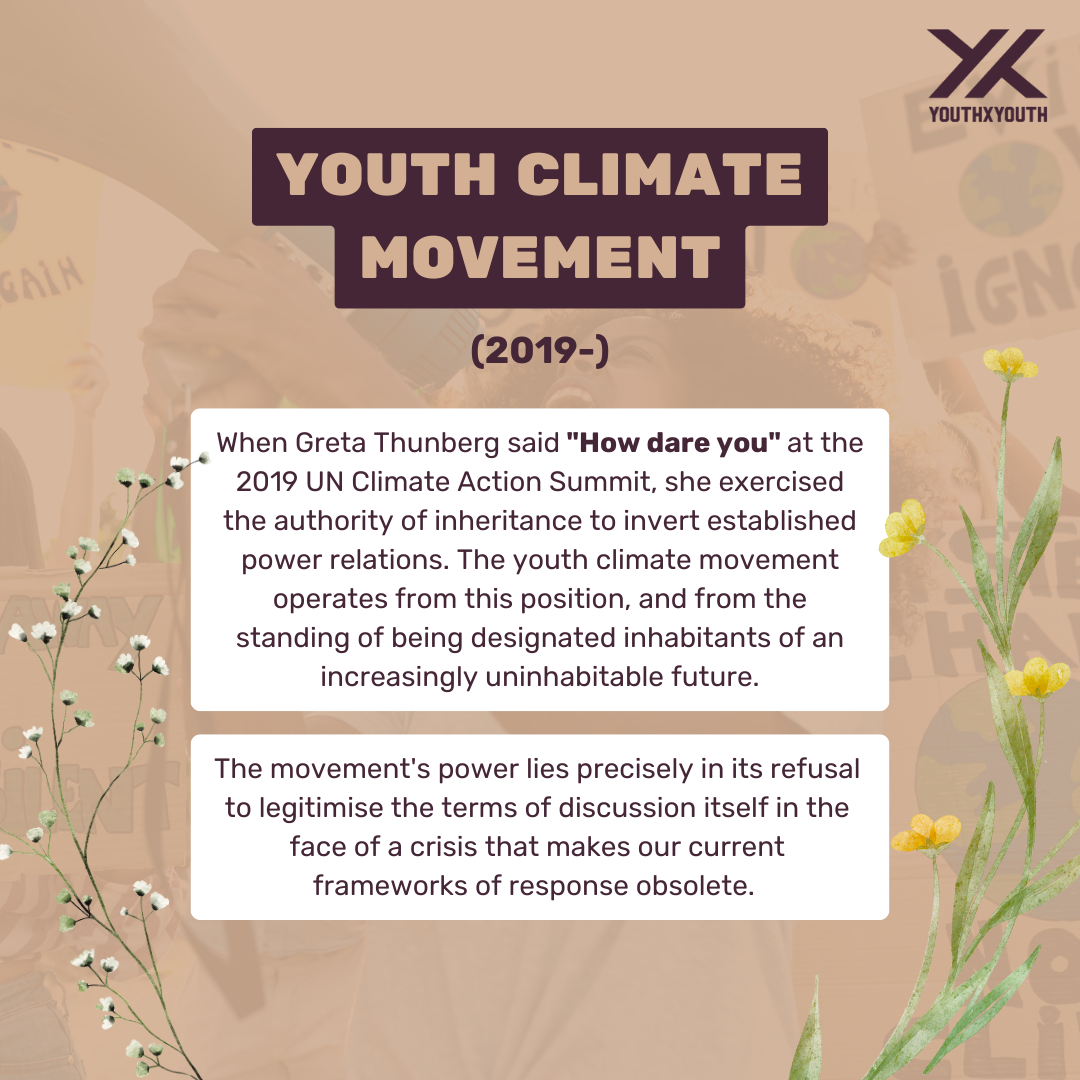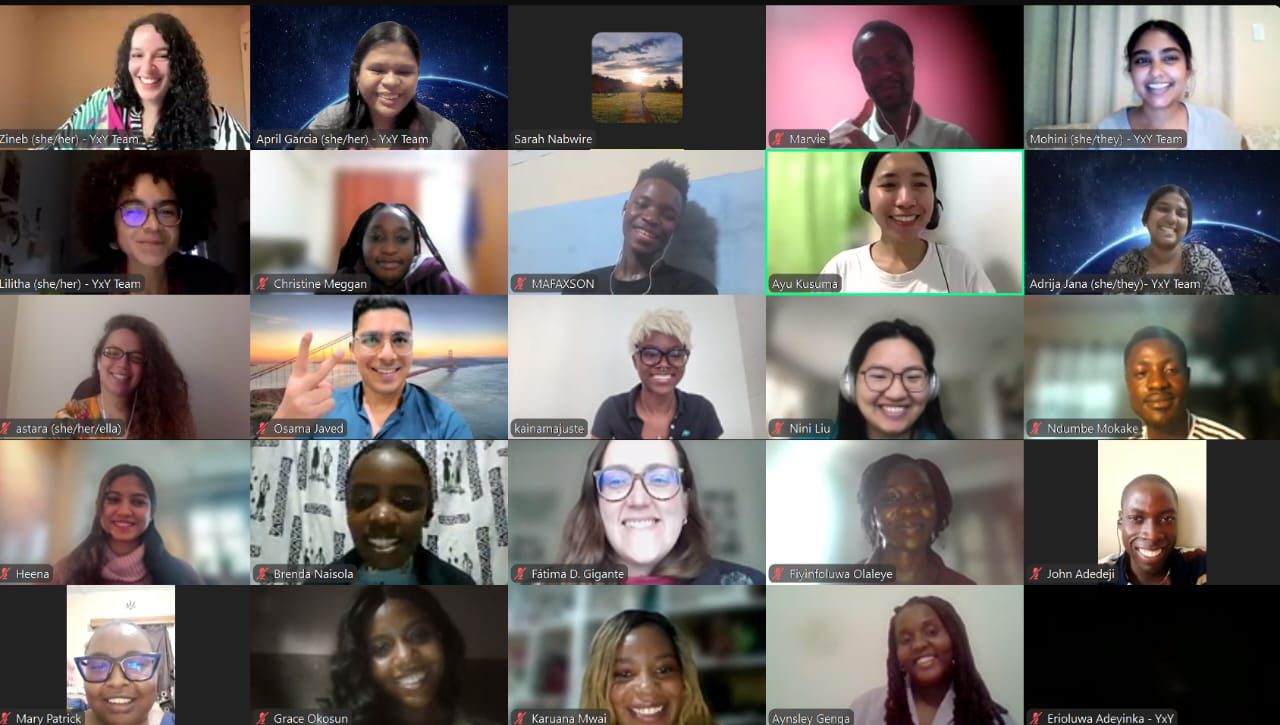In this month's learning invitation, we want to take the time to look at a few unifying elements across youth movements in an effort to learn from collective youth-led power and what sustains this transformative work over time. We truly believe that by studying the power and sacredness of youth movements as a distinct form of resistance, we can identify what young people have learnt through practice. They offer us the gift of learning from their immensely brave experiences.
"We are living in times that will demand courage. When people ask me how do I draw hope, how do I stay encouraged, how do I continue to show up? The answer is that I look back. I look back and I look at how my existence here today is owed entirely to the courage of people who came before me. And so, what do I owe myself in that moment and to those who come after me? To exercise courage in this moment." – Bree Newsome Bass
Authority (The power of inheritance)
The legitimacy with which youth movements speak makes power undeniably uncomfortable. The way they often articulate themselves is grounded in survival rather than what we are used to seeing, which is self-interest. For example, there is no adequate rebuttal when a young person says "you are destroying my future". Young people didn't create these systems, but they will live or die inside them. When youth speak, they speak as inheritors. And inheritance gives you standing. It gives you the right to inventory what you've been handed and to demand what was promised but never delivered.
This disrupts traditional power dynamics entirely. Adults are used to being the authorities, the ones who know better, who have experience, and who understand "how things work." But youth movements flip the script by saying “you made this world”, now explain it to us. Justify it. Defend why we should accept it.
The fundamental challenge to the material basis of their reality is central to so many youth movements. Young people are witnessing firsthand that their material conditions are worsening, not improving. Wherever young people protest, the core of their demand is access to a dignified life. Thus, young people are fundamentally demanding the material conditions necessary for dignity and they are refusing to accept a future of permanent precarity. And perhaps most dangerously to entrenched power, young people are connecting these material struggles across borders and issues. They recognise that all the symptoms of collapse we are witnessing across the globe are different manifestations of the same extractive systems. This collective consciousness (grounded in shared material reality) makes youth movements so formidable.

Temporal agency (The long arc)
Youth movements operate with future-oriented power. They act with a long-term view, asserting responsibility for the wellbeing of future generations. This is transformative because our current systems are built on entirely limited temporal conditions. Youth movements recognise delays as harm. And every day of delay is measured in lives, species, and in possibilities foreclosed.
Instead, youth movements redefine time as something that can be shaped, contested, and reclaimed, rejecting narratives that present the future as predetermined or inevitable. This positioning empowers youth to rewrite the terms of progress and reorient our priorities. They challenge systems that prioritise short-term gains over collective long-term “survival”. They expose the false binaries designed to make the status quo seem inevitable. This fundamentally creates space for imagination. It allows young people to say the world doesn't have to be this way because it wasn't always this way and it won't always be this way.

Ontological resistance (Being “otherwise”)
Youth movements challenge fundamental assumptions about what is real, what is possible, what it means to be human in relation to each other and the more-than-human world.
To us ontological resistance means challenging the very categories that structure our world:
- Rejecting the human/nature binary and recognising our interdependence with all life
- Refusing the individual/collective split and practising embodied collectivity
- Dismantling the sacred/political divide and bringing spiritual practice into social struggle (we are made whole by our humanness not in spite of it!)
- Questioning all imposed binaries: gender, sexuality, ability, the line between alive and thriving
An aspect of what they're daring as possible is how they engage with new forms of mobilisation through digital tools, creating an internationalist dimension to their resistance. Social media has very glaringly become both weapon and battleground. The existing powers that youth movements challenge have learnt to weaponise these same technologies. Surveillance and misinformation are being deployed to fracture solidarity and undermine collective action. This field of struggle is central and evolving. We must pay attention to how youth movements adapt their strategies in digital spaces trying to surveil and commodify. The traps embedded within these technologies are very real and youth movements are learning to navigate them whilst holding onto their collective power and clarity of purpose.
Young people practise a very real embodied transformation. They carry the future in their bodies, literally. They will live in the world that is being built right now. They feel it viscerally, in their anxiety, in their rage, and naturally in their exhaustion.

Youth movements are effective because they intervene at the root of societal meaning-making and institutional legitimacy (or lack thereof). They are strategic because they operate in spheres of culture, morality, time, and imagination where traditional power cannot easily respond. They are sacred because they reorient humanity towards our most human obligations, challenging us to reconsider what kind of world will be inherited and who gets to decide.
Want to explore this more deeply? Here is a curated list of recommended resources from the YxY team:
- Movement Memos - hosted by Kelly Hayes (Kelly Hayes connects with activists, journalists and others on the front lines to break down what’s happening in various struggles and what listeners can do to help.)
- Youth Resistance Research and Theories of Change - by Eve Tuck, Ph.D. and K. Wayne Yang, Ph.D (Academic anthology on youth activism)
- Emergent Strategy: Shaping Change, Changing Worlds - by adrienne maree brown (On transformation and collective organising)
- How to survive the end of the world - hosted by Autumn Brown and adrienne maree brown (Podcast that delves into the practices we need as a community, to move through endings and to come out whole on the other side, whatever that might be)
.jpeg)
.png)
%20(1).jpg)



Comments